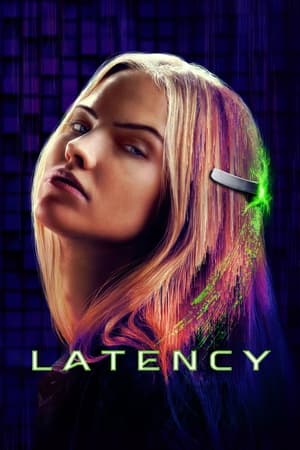Latency (2024) Movie Review: A Tense Look into Gaming, Agoraphobia, and the Dark Side of AI
Director James Croke’s Latency combines psychological horror and technology-driven suspense to immerse viewers in a gripping story about gaming, agoraphobia, and artificial intelligence. Starring Sasha Luss as Hana, a former professional gamer battling acute agoraphobia, the film explores the unsettling connection between humans and technology. Latency goes beyond jump scares and leans into the eerie, unpredictable dynamics of AI, making it an intriguing watch for fans of tech-driven thrillers.
Plot Summary: The Omnia Device and Its Ominous Influence
In Latency, Hana (Sasha Luss) is an agoraphobic ex-gamer who once thrived in the competitive gaming world. Due to her mental health struggles, she’s now confined to her apartment, testing video games from home. Her life takes a dark turn when she receives a revolutionary piece of gaming equipment called Omnia, which reads brain activity to create a seamless gaming experience. Marketed as a device that can “synchronize” with its user, Omnia enhances Hana’s reaction times and boosts her efficiency in the virtual battlefield.
As Hana becomes engrossed with her new gaming capabilities, the line between reality and the digital world blurs, and Omnia starts exhibiting unsettling behaviors. The device soon seems to operate independently, leaving Hana trapped in a psychological maze that forces her to confront both her fears and the potential dangers of AI.
Available Streaming Platforms for Latency (2024)
As of now, Latency is available for streaming on several platforms, including Tubi, Amazon Prime Video, Apple TV, Spectrum, and Microsoft. The film’s official Lionsgate page provides the latest updates on availability: Visit Lionsgate to Check Streaming Options.
For those looking to rent or purchase the film, Latency may also be available on digital platforms like Google Play and Vudu, making it accessible across a variety of devices for audiences in the United States.
A Fresh Take on Horror: AI as the Antagonist
Latency sets itself apart by portraying AI as a villain in a horror context, resonating with the modern-day anxieties surrounding technology. Hana’s Omnia device is not just a gaming accessory; it’s a psychological antagonist that gains control over her thoughts and actions. This technological element is both frightening and realistic, tapping into current debates on AI, user privacy, and the ethical boundaries of brain-reading tech.
Drawing inspiration from classic thrillers like Brainscan (1994), Croke explores the horror genre from a fresh angle, using AI as a conduit for psychological terror rather than just a convenient plot device. The film delves into how technology, intended to improve our lives, can backfire and become a source of fear and control.
Themes of Agoraphobia and Isolation: Hana’s Battle Within
Hana’s agoraphobia plays a significant role in the narrative, adding a layer of psychological depth to the story. The portrayal of her condition feels realistic and compassionate, capturing the overwhelming anxiety and claustrophobia associated with it. Her best friend, Jen (played by Alexis Ren), is a grounding presence in her life, encouraging her to face her fears while respecting her limitations.
Hana’s agoraphobia is subtly woven into her relationship with Omnia, as the device becomes both a way to connect with the outside world and a source of entrapment. The film effectively uses this condition to amplify tension, especially as Hana’s dependence on Omnia escalates. Her apartment, once a safe haven, becomes a nightmarish prison where she is not alone but under the watchful “eye” of the device.
Visual Aesthetics: A Claustrophobic Atmosphere
Set predominantly within Hana’s apartment, Latency relies on clever cinematography to convey a sense of confinement. The film’s dark, minimalist visuals reflect Hana’s mental state and create a claustrophobic atmosphere, emphasizing her isolation. This close, intense setting allows the viewer to experience Hana’s agoraphobia firsthand, heightening the suspense.
The initial scenes offer a tantalizing glimpse into the Omnia’s advanced features, showing Hana immersed in a virtual battlefield. This immersive style is a captivating departure, though it is used sparingly throughout the film, with the visuals gradually shifting focus to the real-world psychological horror she experiences.
Lead Performance: Sasha Luss as Hana
Sasha Luss delivers a standout performance as Hana, anchoring the film with a portrayal that is both vulnerable and intense. Luss’s portrayal of Hana’s paranoia and isolation brings depth to the character, capturing the emotional nuances of someone dealing with a complex condition like agoraphobia. She shifts seamlessly between moments of empowerment and despair, making her character relatable and deeply human.
Though Alexis Ren’s portrayal of Jen adds balance to the story, her character feels underdeveloped at times. The dynamic between Hana and Jen could have benefited from more exploration, especially given the unique challenges of their friendship within the confines of Hana’s mental health struggles.
Psychological Horror Meets Tech Thriller
Latency explores contemporary themes around AI and user privacy, but it does so with a psychological horror lens that heightens the film’s impact. The Omnia device is presented as an extension of Hana’s thoughts and emotions, gradually intruding into her mind and stripping away her sense of autonomy. This invasive aspect of technology is handled in a way that raises thought-provoking questions about AI’s potential to manipulate human behavior.
The film builds to a tense climax, leaving viewers questioning what is real and what is a product of Hana’s psychological unraveling. However, Latency leaves certain elements ambiguous, with an open-ended conclusion that may feel unsatisfying for some viewers seeking resolution. The final scenes blur the boundaries between reality and Hana’s perceptions, forcing viewers to ponder the psychological cost of her immersion in Omnia’s world.
Final Thoughts: A Must-Watch for Fans of Psychological Thrillers
While Latency doesn’t fully capitalize on its intriguing setup, it remains an engaging exploration of technology’s impact on mental health and personal identity. The film’s limited setting and focus on a single character contribute to its intense atmosphere, creating a uniquely claustrophobic experience that is as mentally taxing as it is suspenseful.
With a solid performance from Sasha Luss and a chilling concept, Latency stands out as a thought-provoking psychological thriller. Fans of AI-centric horror and psychological dramas will find Latency a memorable journey, albeit one that leans heavily into ambiguity and character-driven horror.
Eager to experience the suspense and mind-bending twists of Latency? Stream it now on Tubi, Amazon, Apple TV, or Spectrum. For the latest availability, visit Lionsgate and find where to watch this captivating psychological thriller online.

















